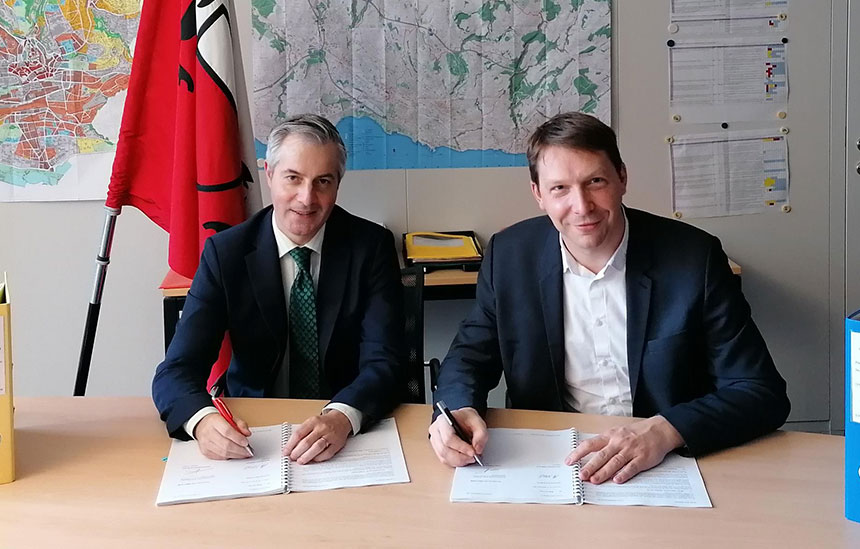Thanks to a combination of advanced technologies unique in Europe, the plant will produce water that exceeds regulatory requirements.
The Service de l’eau de Lausanne (Lausanne Water Service) and Veolia, through its subsidiary OTV Switzerland, representing a consortium formed by OTV Switzerland, Amics and IDEM Suisse, signed a contract worth 44.8 million francs for the design, supply, construction and commissioning of equipment for the new Saint-Sulpice II drinking water production plant. The plant will feature an innovative and scalable multi-barrier process, unique in Switzerland and in Europe.
The Municipality of Lausanne has set itself the objective of producing water of excellent quality in terms of turbidity, microbiology and micropollutants. In operation since 1971, the current facility has aged and is no longer in line with recent technological developments. After carrying out several tests and piloting various processes, in particular with Veolia, to review all available technologies, the Lausanne Water Service selected a multi-barrier process.
With a nominal production capacity of over 100,000 cubic meters per day, the plant will provide between 30 and 50% of the drinking water demand of the 380,000 inhabitants of the Lausanne region for 20 years. After obtaining the building permit, to be issued by the Canton of Vaud at the start of 2022, work should begin in 2023 with a first part commissioned in 2026. The entire plant should be completed in 2027-2028.
A multi-barrier system unique in Switzerland and in Europe
The production of drinking water will be ensured by a multi-barrier system composed of a treatment core featuring advanced oxidation, adsorption by activated carbon and ultrafiltration membranes. In addition, approximately 10 to 15% of the flow will be treated by nanofiltration to improve overall micropollutant removal.
Arnaud Valleteau de Moulliac, Executive Vice President Europe for Veolia Water Technologies, said: “The elimination of micropollutants and endocrine disruptors is an important issue; finding effective and sustainable solutions to address it is an integral part of Veolia’s ecological transformation process. The unique technological combination that we have offered to the Lausanne Water Service represents the best solution to meet water quality and public health objectives while controlling energy costs.”
About OTV
OTV, a Veolia Water Technologies subsidiary present in France and Switzerland, provides the complete range of services required to design, deliver, maintain, upgrade and manage water and wastewater treatment facilities and systems for industrial clients and public authorities. By optimizing both processes and monitoring, OTV helps its clients reduce their water footprint while generating considerable savings in energy and chemical consumption. www.veoliawatertechnologies.com
——
Veolia group aims to be the benchmark company for ecological transformation. With nearly 179,000 employees worldwide, the Group designs and provides game-changing solutions that are both useful and practical for water, waste and energy management. Through its three complementary business activities, Veolia helps to develop access to resources, preserve available resources, and replenish them. In 2020, the Veolia group supplied 95 million people with drinking water and 62 million people with wastewater service, produced nearly 43 million megawatt hours of energy and treated 47 million metric tons of waste. Veolia Environnement (listed on Paris Euronext: VIE) recorded consolidated revenue of €26.010 billion in 2020. www.veolia.com

